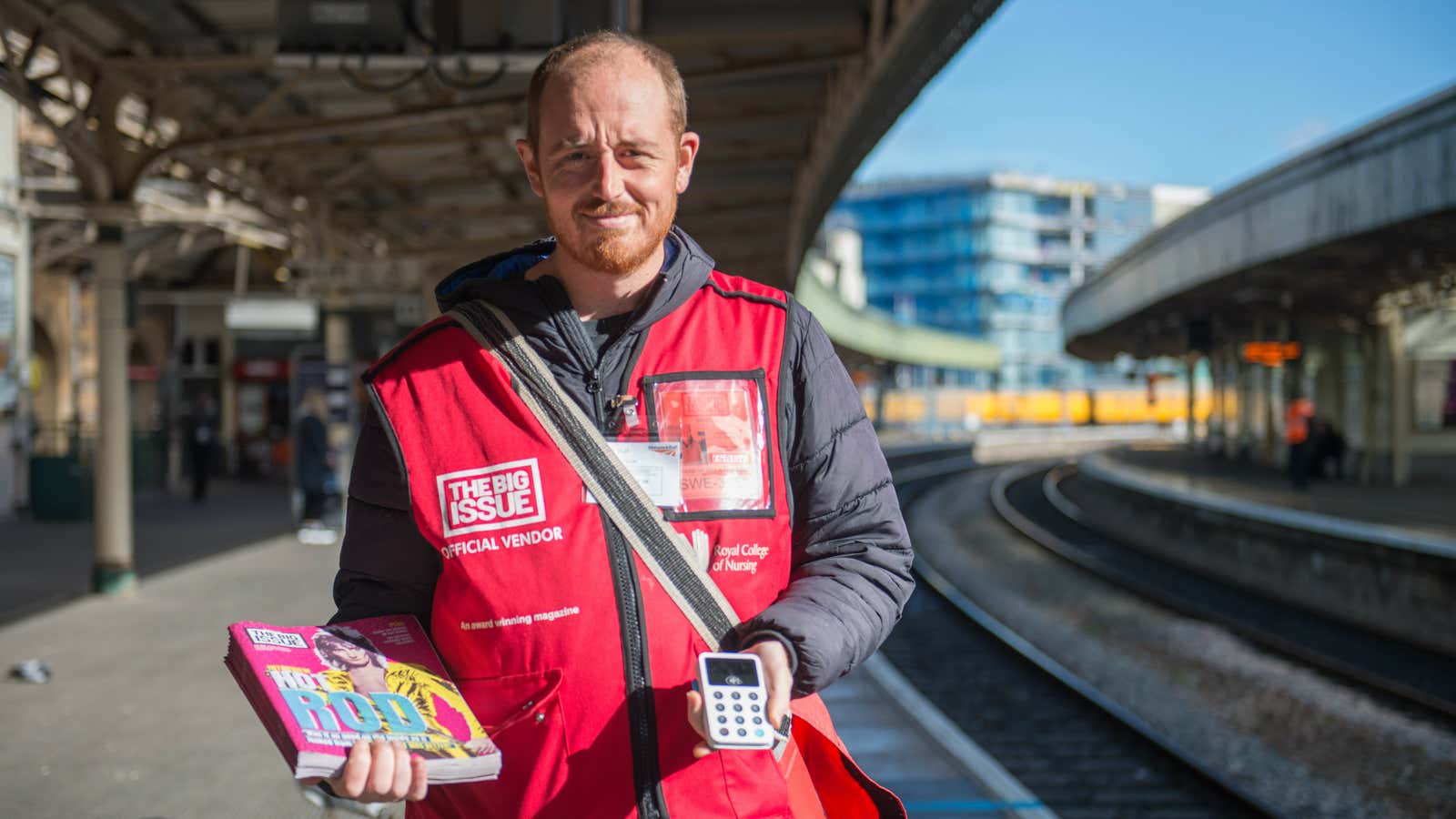Selling The Big Issue on the streets of London is difficult when fewer people are carrying cash in their pockets. That’s why the magazine, which helps homeless and other vulnerable people start their own micro-enterprises, is equipping its vendors with payment card readers across the UK.
“I have seen my sales increase by a third, which is incredible,” Mike Hall, 29, who sells the magazine in Bristol, said in a statement from The Big Issue. “It has been really important in attracting more customers to buy copies of the magazine.”
Cash usage for payments is in decline in many places around the world, and Britain is further ahead than many other countries. Only about 30% of transactions in the UK use paper notes and coins, and that figure is expected to fall to as low as 10% in the next 15 years.
To compensate, The Big Issue began testing a program late last year that provided some vendors with contactless card readers from iZettle. Selling the magazine is a way for people to pull themselves out of poverty. They buy the publication with their own money for £1.25 ($1.60) per issue and then sell it on the street for £2.50. Since its start in 1991, the magazine says more than 100,000 vendors have participated, and have sold more than 200 million copies.
“Big Issue vendors are micro-entrepreneurs, effectively running their own small businesses,” Russell Blackman, the publication’s managing director, said in the statement.
The Big Issue and iZettle, owned by PayPal, began rolling out the contactless payments initiative nationwide yesterday. They say the pilot program showed that accepting card payments gave vendors “a significant uplift in sales.” On average, a quarter of the vendors’ sales came via iZettle readers.
Is cashless a good idea?
Digital payments are quick and convenient, can discourage tax avoidance, and can make small businesses less susceptible to robbery. But the elderly, poor, and people with handicaps can be especially vulnerable when cash isn’t accepted. Millions of people still rely on paper notes and coins in Britain, which is why the UK Treasury said in May that it was setting up a group of regulators to safeguard cash availability.
Changing preferences for quick and easy contactless payments are only part of the story. Digital transactions are more profitable for banks (they make money on card payments), whereas they lose money on ATM transactions.
News reports indicate that at least one major UK bank has directed staff to push customers away from bank branches—a key resource for cash availability—and onto online services. In Lossiemouth, Scotland, a local official told Quartz earlier this year that major banks had restricted availability of services at branches so much that they were less useful, and that poorly maintained ATMs frequently ran out of cash.
Companies like iZettle, as well as the card networks Visa and Mastercard, are beneficiaries of anything that shifts consumers away from cash and toward digital transactions. Their stock prices have soared as more money changes hands digitally. One of their biggest risks is blowback over financial inclusion.
A report (pdf) earlier this year about the UK’s access to cash warned that, without proper oversight, “millions of people could potentially be left out of the economy, and face increased risks of isolation, exploitation, debt and rising costs.” Some major US cities require physical stores to accept paper money and coins.
Banking without a fixed address
It’s difficult for anyone without a fixed address and adequate proof of identity to get access to banking. To provide services, banks typically adhere to anti-money laundering (AML) requirements that include proof of residence and ID.
Not having a bank account can make it especially difficult for a homeless person to scrape together the money to afford formal accommodations. More than 300,000 people in the UK are affected by homelessness, according to Oxford-based Greater Change. The organization’s digital platform is designed to give homeless people a way to accept cashless donations and ensure the money is used for things like a place to live.
The people in The Big Issue’s pilot program were chosen because they already had bank accounts. However the publisher told Quartz in early 2019 that the magazine was in talks with banking groups to develop accounts for people who don’t have a fixed address. Blackman said he was confident they would be able to connect homeless people with basic banking services, which could be available even to those who don’t sell the magazine.
It wasn’t clear from The Big Issue’s press release whether that obstacle had been cleared away or not, and the publication wasn’t immediately able to comment. However there are at least some signs of progress. Jim Hannah, 59, a vendor in Norwich, said he had obtained a passport and bank account since joining the iZettle program.
“Before all this started I had no ID, no bank account, and a rubbish phone and now I have a decent smartphone, a passport, a Monzo bank account and a card reader,” Hannah said. “I am really pleased to be able to offer card payments to my lovely customers.”
